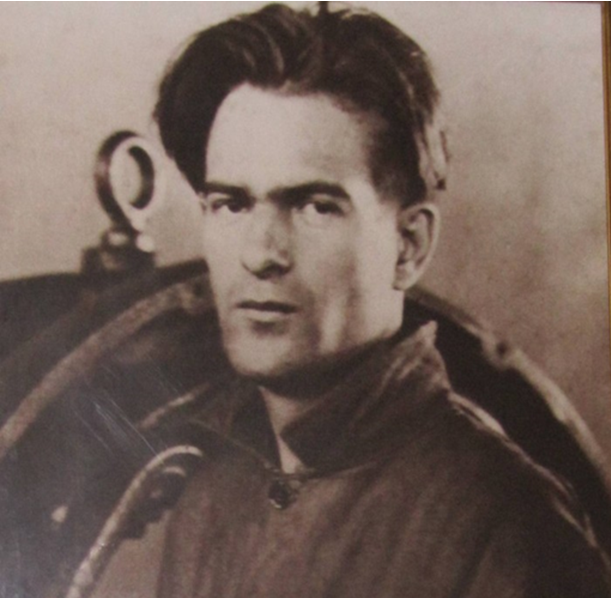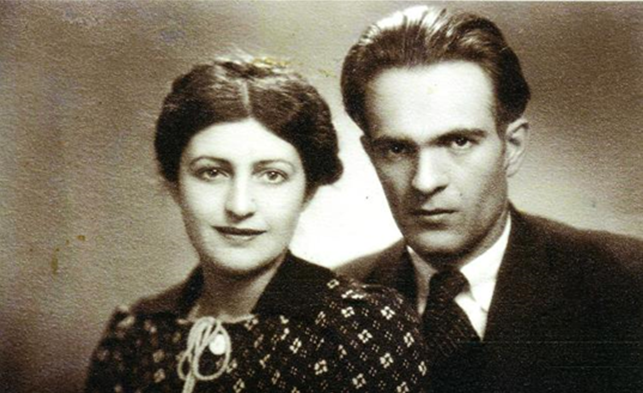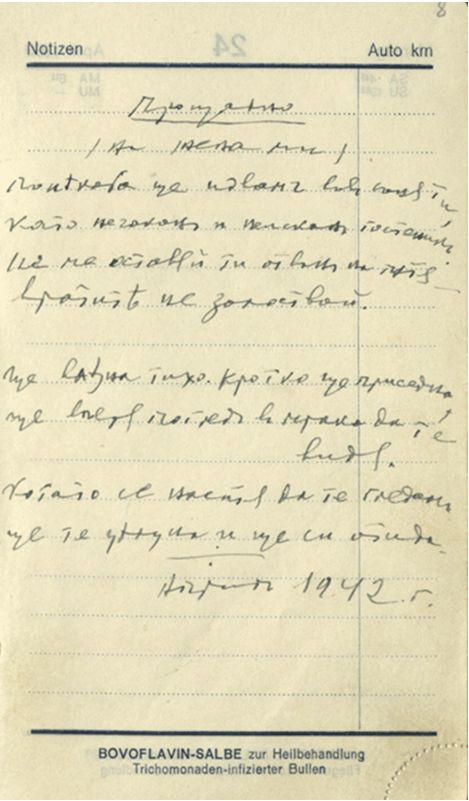Famous People from Bansko: Nikola Vaptsarov (1909 – 1942)
When it comes to Bansko, the first associations of the locals are the ski slopes, the priceless landmarks of Bulgarian history, and… Nikola Vaptsarov – one of the most loved and widely popular Bulgarian poets from the past.
You will hardly find a Bulgarian who does not know who Nikola Vaptsarov is and hasn’t felt the deep impression upon reading at least one of his poems. So today, we are again turning an eye to Nikola Vaptsarov and the priceless heritage of his life, work, and genius.
Below, you can read all about the early years, the education, and the adulthood of the poet – until he found his death sentence for fighting for his ideals. Most of these stories are well-preserved and still breathing in the Nikola Vaptsarov house museum in Bansko, which is open for visitors all year round.
Famous People from Bansko: Nikola Vaptsarov (1909 – 1942)
Nikola Vaptsarov was born on a beautiful December morning in 1909 in the family of Yonko Vaptsarov and Elena Vaptsarova. His father, Junko, was an active member of the IMRO (Internal Macedonian Revolutionary Organization) and voivode fighting for the liberation of Macedonia. His mother was one of the most erudite ladies in Bansko at the time.

The first years of the life of Nikola, or Nikolche (as his mother called him), included welcoming and saying goodbye to his father, the voivode, and his associates and listening to his mother’s stories.
The latter did not forget to tell her children some interesting stories or to read a book before they went to bed. Raised in such an inspiring environment in the Vaptsarov family, little Nikola became a bright, socially engaged, and extremely hardworking child who dreamed of devoting himself to literature and education.
After completing his elementary education in his hometown Bansko, Nikola Vaptsarov applied and was admitted to the high school in Razlog, where his passion for literature deepened.
During this time, the young Vaptsarov became acquainted with the works of the great world-famous writers of classics, and he became involved in school activities as a declamator and artist. In 1926, his first poem entitled “Toward Bright Ideals” was printed on the pages of the “Borba” newspaper.
However, the desire of the future poet to continue his education and study literature remained only a dream since his father was against it. So Nikola, who from a young age listened to his parents, gave up on his dream and enrolled study at the Maritime Machine School in the city of Varna.
The time spent as a cadet at the Naval School was very difficult for Vaptsarov, but it had a huge impact on his personal growth. During this period, the future poet became very active as an amateur artist, joined various youth societies, and began to actively write poems published in many current newspapers and literary publications.
During his studies at the Naval School, Nikola Vaptsarov made his teaching practice on the “Druzki” military ship. Shortly before graduation, the poet was moved on the “Burgas” ship, with which he visited Constantinople, Beirut, Famagusta, and many other cities around the world.
We mention the practice of the ship “Burgas” because, during this practice, Vaptsarov falls in love with the sea and the machines and creates several poems on this subject, one of the most popular of which is called “Letter” and begins so …
“Do you remember the sea and the machines and the holds full of sticky darkness? And that wild longing for the Philippines, for the big stars over the city of Famagusta…”
In 1932, Vaptsarov graduated from the Naval School and received a diploma in mechanical engineering. During his graduation, the great Bulgarian poet was chosen to give a speech in front of all graduates.
He made a fervent speech that not only inspired but showed that he was no longer a boy but a socially engaged young man who had his position on the situation of the country and the world.
After graduation, Nikola returned to the town of Bansko to decide where to go after completing his secondary education.
His inclination for literature was still very strong, and the young man did not hesitate much and applied for a job in the popular “Zora” newspaper. But unfortunately, his writing style was not in line with the policy of that newspaper, and he was not approved.
To avoid spending a long time without a job, Vaptsarov decided to suppress his desire to have a newspaper career and started working in the village of Kocherinovo as a mechanic in the factory in the forest industry.
Working in the factory was difficult, and Nikola Vaptsarov became very aware of the difficult social situation of working-class people, which made him increasingly critical of the current government policy.
As an idealist man who yearned for a better and fair world, Nikola became a leader of the professional company in the factory. He defended workers’ rights and was passionate about socialist ideas that preached “Freedom, Equality, Brotherhood”.
The time he worked at the factory in Kocherinovo was the happiest and, at the same time, the saddest for Nikola Vaptsarov.
In Kocherinovo, he met the love of his life – Boyka, and they started a family together. Shortly after that, Boyka gave birth to his beloved son, and Nikola was the happiest man. Unfortunately, the young couple’s happiness was quickly ruined by the death of a child who died before the age of one.

This misfortune was accompanied by the fact that in 1936 there was a major accident at the factory, and Nikola Vaptsarov was fired and left without a job.
The lack of work and the grief of the loss of their son forced Nikola and Boyka to move to Sofia city to find a better job and soothe the pain of their loss.
In Sofia, Vaptsarov found a job as a fireman at the Bulgarian Railways and later at the State incinerator. Working in Sofia has been difficult and unmotivating, and Nikola has been coming home every evening more and more exhausted. But even in this extremely difficult period, he never stopped writing poetry.
So, in 1940, he published his first and only book of poetry, “Motor Songs”.
The book of poetry included poems such as:
- “Faith”
- “Spring in the factory”
- “Memory”
- “Romance”
- “Duel”
- “Letter”
- “A song for the man”
Today, these poems are translated into many languages. Therefore, they are not only part of the literature classes in Bulgarian schools but are included in the educational plan of many European countries.
Shortly before World War II, Nikola Vaptsarov, who already had a clear left-wing partiality, became a member of the Bulgarian communist party and began to engage in propaganda and subversion activities. Because of this propaganda activity, he was arrested and interned in Godech in 1940, where he remained for three months.
He was released from Godech just when Germany invaded the Soviet Union, which practically engaged the world in World War II.
As a left-wing supporter, strongly believing in the socialist utopian idea, after coming to Sofia, Nikola Vaptsarov did not think for a long time and immediately began to look for a way to join the resistance movement.
Shortly afterward, he contacted Tsvyatko Radoynov, who gathered a subversive group, and Nikola joined it. The group had to perform anti-fascist strikes against the German troops in our country.
The group’s activities, along with the spread of propaganda material, led to a police investigation that ended with the arrest of 750 members of the Communist Party, including Nikola Vaptsarov. Several weeks after the arrests, most of the detainees were released, but Vaptsarov remained on trial, known as “Case 585/42”.
On July 6, 1942, the trial began, during which the Sofia Military Court accused Nikola Vaptsarov and five other members of the BCP. The charges were for subversive organized activity aimed at changing the state order and illegal subordinated activity aimed at damaging the Allied troops of the Third Reich dislocated in Bulgaria.
On July 23, 1942, the Sofia Military Court sentenced Nikola Vaptsarov to death, and the sentence was executed the same evening at the Sofia garrison shooting range. Two months before he lost his life, Nikola Vaptsarov wrote “Farewell” – one of the most beautiful, romantic, and eternal poems, which begins as follows…
„Sometimes, I’ll come to your dream
as an unexpected and unwanted guest …

Nowadays, the life and activity of Nikola Vaptsarov are viewed from quite contradictory angles. According to some of our contemporaries, Vaptsarov is a communist and anarchist, while others say he is anti-fascist.
For the people of Bansko, however, Vaptsarov is an extremely talented poet – an idealist who believed with all his soul that people could live in a more peaceful, happy, and beautiful world.
He was born and lived in turbulent, troubled, and extremely difficult times for the Bulgarian people. He had witnessed the devastation and poverty that had hit Bulgaria and the world after World War I, and also he had seen the onset of World War II. Therefore, it was unthinkable to remain indifferent to everything that happened around him.
Until his last breath, Nikola Vaptsarov did not stop fighting for the idea in which he believed with all his heart. The poems he has written have left a bright mark and a personal stamp on everyone who reads them to this day.
That is why even today, Vaptsarov – the poet, idealist, dreamer, and utopian – is one of the most honored artists in Bansko and throughout Bulgaria.
Being the home of Nikola Vaptsarov, Bansko keeps a real treasury of him and his family tree. In the house museum of Nikola Vapstarov, you can see a rich documentary, an ethnographic collection, and well-preserved original belongings of the poet.
This is one of the first museums in the Pirin region, officially declared a historical monument of culture of national significance in the State Gazette in 1973.
If you haven’t visited the house museum of Nikola Vaptsarov yet, your vacation in Bansko would be the best time to cross this experience out of your list.
When you enter the museum, you can see his children’s room, get acquainted with the activity he has developed, feel his poems and pay homage to the person who never stopped believing in people. You will also see the World Peace Council award, which he was granted after his death in 1952.
If you decide to take some time and visit the house-museum of Nikola Vaptsarov, you can do it every day of the week. Video materials enrich the exposition, and the local guides will do their best to give you all the details needed to understand, appreciate, and love everything Nikola Vaptsarov has been and all he’s left behind.